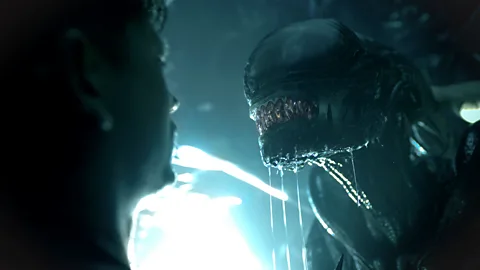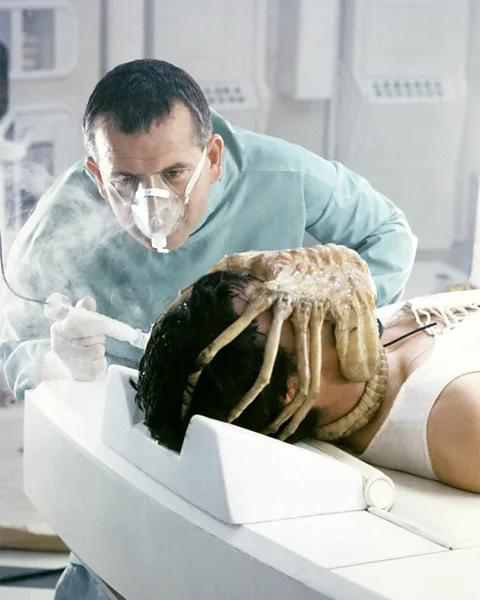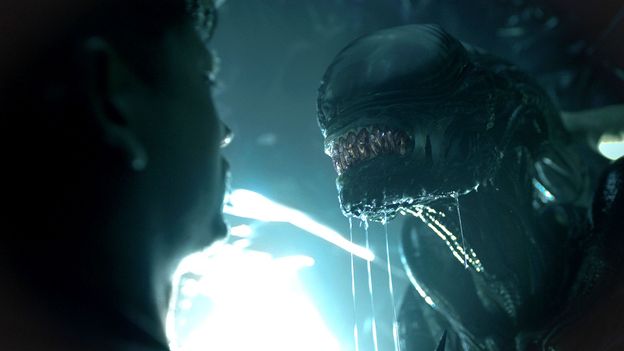 Disney
DisneyThe new Alien film has enraged many with the re-appearance of an actor from the 1979 original – brought back from the dead using digital trickery. Is such anger justified?
The latest film in the Alien series, Alien: Romulus, harks back to Ridley Scott’s 1979 classic in all the ways you might expect: it’s got shadowy spaceships, a steely heroine and phallic beasties bursting out of people’s chests. But the new instalment, produced by Scott and directed by Fede Álvarez, plays homage to Alien in a way you might not expect, too.
Warning: This article contains spoilers for Alien: Romulus
One of its characters, Rook, is a robot who looks and sounds almost exactly like Ash, a robot played by Ian Holm in the first Alien. The twist is that Holm died four years ago, so his doppelganger in Alien: Romulus is a remarkable combination of puppetry and digital imagery.
To me, Rook’s appearance was a spine-tingling surprise, but I said in my review that it might upset the series’ fans, and that’s proven to be the case. On social media and elsewhere, many have condemned the deep-fakery as a disgraceful act of grave robbery or necromancy, as well as an aesthetic failure. In Slate, Sam Adams asked the sarcastic question: “Why let the dead rest when there’s IP [intellectual property] to be mined?” He went on to compare the film’s studio to the franchise’s villainous Weyland-Yutani corporation, in that it’s “a massive conglomerate that puts profit ahead of respect for human lives”. In SlashFilm, Chris Evangelista didn’t mince words: “It’s distracting and weird. It never, ever looks real… The simple truth here is that not only does this look bad, it’s a bad idea all around.”
But was duplicating Holm really such a bad idea? After all, it’s hardly the first time that an actor has kept working after they’ve stopped living. In 2005, Gene Kelly’s Singin’ In The Rain routine was “updated”, complete with Kelly apparently breakdancing, in an advert for Volkswagen Golf GTI cars. More recently, science fiction has become the home of actors who are, in theory, no longer with us. Sci-fi fans are used to seeing futuristic technology and bizarre creatures on screen, and they enjoy seeing their favourite characters in sequels and spin-offs, so they’re more open to such digital cloning than, say, romantic comedy fans might be. When Princess Leia and Grand Moff Tarkin turned up in 2016 Star Wars prequel Rogue One, the actors’ faces were altered to look like those of Carrie Fisher and Peter Cushing, as they appeared in the original 1977 film. In Ghostbusters: Afterlife, one ghost resembled the late Harold Ramis.
A fitting twist?
Alien fans, specifically, should be even more open to such techniques. It’s long been part of the series’ lore that multiple androids can be identical: the two played by Michael Fassbender were central to Alien: Covenant. And as Romulus and Remus were the legendary twins who founded Rome, the sub-title of Alien: Romulus is a direct reference to the theme. The series also has a history of bringing people back from the dead. The fiery obliteration of Sigourney Weaver’s Ripley in Alien 3 didn’t stop the actress returning in the aptly titled Alien: Resurrection.
Besides, the creation of Rook is just the sort of digital sleight of hand which Scott has pioneered. His production of Gladiator was interrupted by the death of one of its lead actors, Oliver Reed, but Scott rearranged and revised the footage of Reed he had already shot so that his character’s storyline would be preserved. Years later, after Scott had finished shooting All The Money In The World, one of the cast, Kevin Spacey, was accused of sexual misconduct, but, again, Scott didn’t let that faze him. He reshot Spacey’s scenes with Christopher Plummer in the same role, in some sequences splicing together existing footage of the other actors with new footage of Plummer. When you’re in one of Scott’s films, it seems, the show must go on – and neither death nor disgrace is allowed to get in its way.
 Getty Images
Getty ImagesThe misstep made by Álvarez on Alien: Romulus was to give Rook almost as much screen time as the other characters. If the Holm-like android had been used sparingly, with a glimpse here and there, the effect would have been uncanny in a good way. If his head had been mangled by his encounter with an acid-blooded monster, we wouldn’t have minded that he looked so zombie-ish. But Rook is shown in scene after scene, in close-up after close-up, until the flat waxiness of his face becomes impossible to ignore, and the dubious taste of the enterprise becomes hard to deny. It just doesn’t feel right.
Holm’s estate gets a prominent “thank you” in the end credits, as if to reassure the viewer that there is no need to be squeamish about his lookalike. And in an article by Carlos Aguilar in the Los Angeles Times, Álvarez goes on the defensive, pointing out that he consulted Holm’s widow, that animatronics were used more than CGI, and that he wasn’t robbing a living actor of a job: Daniel Betts was paid for his vocal impersonation of Holm. But the more we see of Rook, the more questionable his inclusion becomes. At the end of the screening I attended, Daily Telegraph critic Tim Robey commented, “One thing I never thought I’d complain about in 2024 was a film having too much Ian Holm in it.”
Still, perhaps viewers’ discomfort with Rook is good news for actors who don’t want to be made redundant by computer-generated doubles, and good news for those of us who dread the prospect of seeing new dramas “starring” Marilyn Monroe and James Dean. In the case of Alien: Romulus, all the conditions were right for some digital resurrection – the genre, the franchise, the plot, the CGI-savvy producer – and many viewers still weren’t quite willing to accept it. Maybe AI avatars taking over from flesh-and-blood actors will remain the stuff of science fiction for a few more years to come.
Alien: Romulus is out in cinemas internationally now


